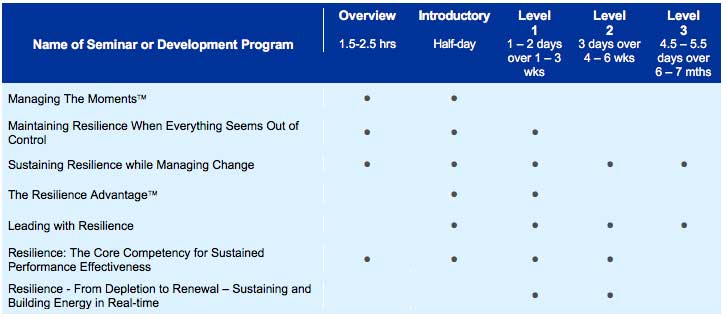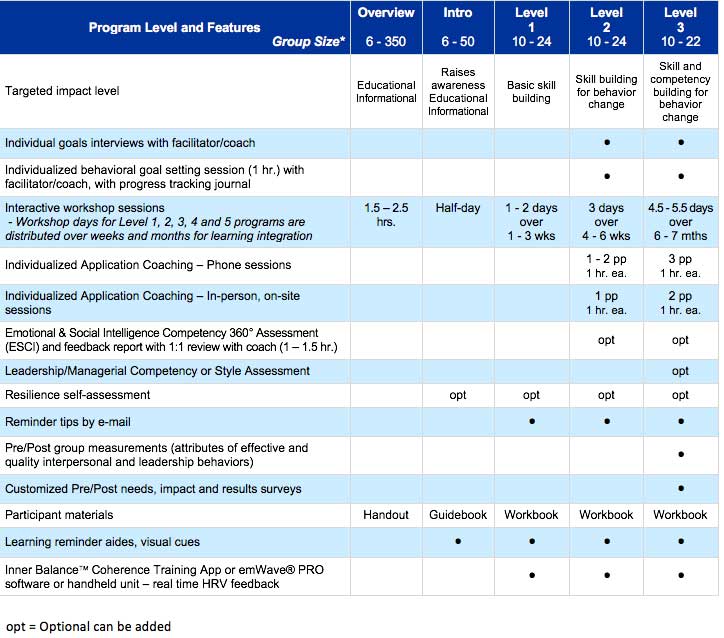Resilience
An ability to consistently recover and “bounce back”
from setbacks; the ability to adjust well to misfortune or change
Resilience
An ability to consistently recover and “bounce back”
from setbacks; the ability to adjust well to misfortune or change

We design and deliver Resiliency training, workshops, seminars and coaching that enable increased agility. We design and deliver stress management training, workshops, seminars and coaching.
Change is a constant today, but have we learned how to maximize our individual, team and organizational effectiveness in an environment of change? More than ever, the ability to remain balanced, clear-headed and focused is a critical skill for moving through change and maintaining productivity. The frequency of change and shifting priorities in today’s workplace, coupled with information overload and time pressure, all have emotions attached to them. Whether we are conscious of it or not, the emotions of frustration, anxiety, uncertainty, fear, anger and worry literally create a desynchronization in brain function, affecting performance at all levels. Core competencies – those talents and skills each contributor brings to the organization and which are needed for success – can be compromised in a heartbeat.
Resiliency is now a core competency for success.
Research in the fields of Neuroscience and Neurocardiology over the past few decades has revealed that when a person is experiencing stressful emotions such as fear, frustration or anxiety, all neural action (learning, memory, cognition and problem-solving) is adversely affected. Stress creates “cortical inhibition” – impeding our cognitive and creative faculties, which causes the brain to be less efficient in making choices.
Is your workforce experiencing any of the following:
- Depleted stamina and enthusiasm? Increased fatigue and burnout?
- Emotional reactivity and skewed perceptions?
- Ambiguity and apprehension evolving into speculation and rumor as managers don’t always have answers to many questions from their staff?
- Increased physical stress symptoms of sleeplessness, muscle tension, headaches, indigestion, hypertension, and depression?
- Quality breakdowns in a domino effect: loss of focus, lowered productivity, higher inefficiency, low morale, higher turnover and absenteeism, poor customer service, increased inefficiencies / costs?
Resilience in individuals is demonstrated in the ability to:
- Consistently recover from setbacks in a healthy manner
- Find constructive responses to setbacks
- Learn from setbacks and apply that learning to new situations
- Maintain one’s energy level
- Regularly give attention to and practice actions for self-care, renewal, health and wellness
- Know when to appropriately say “no”, or “not now”
- Find a sense of control in influencing one’s outcomes
- Seek assistance from others to complete tasks, obtain information, get advice or support when needed
Without these abilities individuals frequently:
- Feel overwhelmed or depleted
- Experience anxiety, depression, burnout and other health problems
- Place self-care and renewal activities low on their priority scale
- Avoid asking for help or seeking assistance from others
- Feel a sense of no control over their circumstances
Organizational resilience depends upon resilient leaders who are able to:
- Demonstrate resilience
- Recognize and understand what emotions and effects they are feeling and why
- Self-regulate stressful emotions and effects to maintain focus on the highest-value priorities
- Recognize and understand what others are feeling and how they are being affected by change or set-backs
- Influence and lead others for engagement and to navigate change most effectively for sustained performance

LEARN:
- The characteristics of resilient behavior
- To sustain positive outlook and motivation
- To strengthen flexibility and adaptability
- To quickly change negative, draining reactions into proactive, creative ones
- To reduce emotional reactivity to stressful triggers
- How to transform feelings of uncertainty, anxiousness, frustration, fear, anger or worry for more productive solutions
- To apply the Quick Coherence® and Freeze-Frame® tools to access physiological coherence and think clearly under pressure
- To eliminate procrastination and enhance decision-making during times of uncertainty
- Breakthrough scientific research on the relationship between the heart’s electrical system, immune system health and brain/mind function
- Cutting edge research on how emotions experienced during periods of stress and uncertainty (worry, apprehension, anxiety, fear, anger, frustration, etc.) inhibit higher brain function and inhibit our capacity for performing at one’s best.
- How our perceptions can set off a chain reaction of stress and frustration, inhibiting higher brain function and suppressing the immune system for up to six hours
- Learn and apply scientifically-validated tools to override these reactions for greater focus and productivity by quickly changing negative, draining reactions into proactive, efficient responses
Other benefits:
- Decrease fatigue and burnout; regain energy
- Reduce many stress symptoms
- Increase productivity and effectiveness
- Reduce procrastination and improve decision making.
- Enhance communication and teamwork
Resilience Programs

The Resilience Advantage™ training is a certified HeartMath training.
Features and Program Formats

Wellness – Transforming Stress in Today’s Work Environment (and non-work environment)
“We are coming to understand health not as the absence of disease, but rather as the process by which individuals maintain their sense of coherence (i.e. sense that life is comprehensive, manageable, and meaningful) and ability to function in the face of changes in themselves and their relationships with their environment.”
–Aaron Antonovsky, Unraveling The Mystery of Health;
How People Manage Stress and Stay Well.

Consider how stress affects the bottom-line:
- 40% of employee turnover is due to stress
- 72% of American workers experience frequent stress-related physical or mental conditions that greatly increase health care costs.
- 75 – 90% of all visits to physicians are for stress related disorders – American Institute of Stress
- A 20 year study of over 1,700 older men conducted by the Harvard School of Public Health found that worry about social conditions, health and personal finances significantly increased the risk of coronary heart disease.
- One study of 202 professional women, tension between career and personal commitment to spouse, children and friends was the factor that differentiated those with heart disease from those who were healthy. Women and Health
- Duke University study shows that emotions such as tension, frustration and sadness can trigger a drop in blood supply to the heart. In daily life, these emotions more than double the risk of myocardial ischemia, an insufficient blood supply to heart tissue that can be a precursor to a heart attack. – Journal of the American Medical Assoc.
- Men who complain of high anxiety are up to six times more likely than calmer men to suffer sudden cardiac death. – I. kawachi et al. Circulation. 1994
- Researchers found that older adults with high levels of the stress hormone cortisol performed worse on memory tests and had a smaller hippocampus, the part of the brain responsible for learning and memory, than older adults with moderate or low cortisol levels. Tests with young adults found that short, temporary increases in cortisol negatively affected thinking and memory skills. – S. Lupien. Psychoneuroendocrinology, 2005, McGill University, Montreal
Through a combination of lecture, experiential and interactive exercises, scientifically validated tools are learned and practiced. The result is that people learn to transform inefficient, draining, emotional reactions into more productive responses. Productivity increases and health improvements are often measured.
These benefits have been reported by and measured among individuals using the tools taught in this program: Click to review results
Reductions in:
- Stress
- Blood Pressure
- Anxiety
- Worry
- Anger, Hostility
- Fear
- Sadness, depression
- Resentment
- Guilt
Improvements in:
- Peacefulness, Calm
- Psychosocial functioning
- Focus
- Emotional Intelligence
- Emotional Awareness
- Emotional Management
- Communication
- Caring
- Empathy
“Freeze-Frame is a unique stress reduction technique that is unusually effective for reducing anxiety and improving performance. Unlike many other services and products that make similar claims, it has a solid scientific basis, and has been thoroughly tested in the workplace and other settings that have clearly demonstrated these benefits.” Paul J. Rosch, M.D., F.A.C.P., President, American Institute of Stress, Clinical Professor of Medicine and Psychiatry, New York Medical College.
“The Freeze-Frame intervention for managing stress on the psychological and biological level is a landmark achievement. An effective and scientifically validated approach to achieving mastery in everyday life.” Gerhard Werner, M.D., former Dean, University of Pittsburgh School of Medicine; former Assistant Chief of Staff, V.A. Medical Center.Team Coherence

